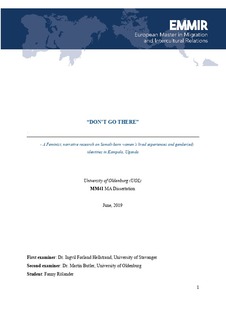| dc.description.abstract | Through an intersectional and feminist narrative approach, the narratives from seven Somali-born women, aged 32-42, who have migrated from Somalia and are now living in Kampala are analysed as to discuss gender(ed) identities, femininities, and subjectivity at late modernity. This is done through postcolonial and intersectional feminist perspectives on gender, identity, femininity, and patriarchy. As such, their stories are taken as personal and political. Thus, the Somali women’s narratives are analysed in relation to the socio-cultural and socio-political contexts of the nation(s) and the localities in order to deepen the understanding of their accounts around self-perception(s) and lived experiences and the meanings that they harbour. It henceforth offers an exploration of current debates around normative gender(ed) identities, femininity, and subjectivities, and the possible connections between their local and global constructions through the case of migrant, Somali women in Kampala by arguing that there is a huge danger and risk in simplistic denotations of patriarchy, gender, and oppression. These Somali women’s herstories are constructed against various lived experiences and other factors with a significant emphasis on how women’s sexualisation, symbolic representation, discrimination, and vulnerability limit and hinder their mobility and available options. Just as much, their previous traumas and interactive constructions of culture and religion shape their notions of self with particular emphasis on motherhood and community membership. In addition, this study warranted discussing the production of knowledge in a dialogical relationship between differently situated and positioned researchers and research subjects, particularly considering the violence inflicted upon study subjects, by foremost Western scholars, due to lingering colonial sentiments and the epistemic violence that is rooted in this as well as other systems of domination. In this epistemological and methodological discussion, I argue that it was paramount to aim for a position of situated knowledge and imagination in order to make accountable knowledge claims. Notwithstanding, I claim that you always run the risk of losing such a position unless you are continuously and deliberately questioning your own interpretations and imaginations. | nb_NO |

